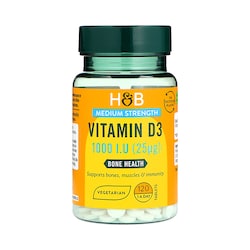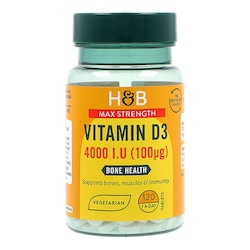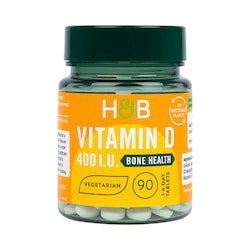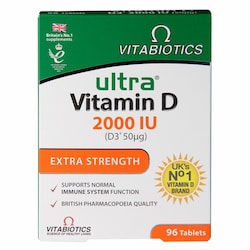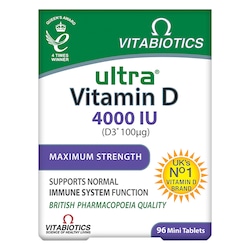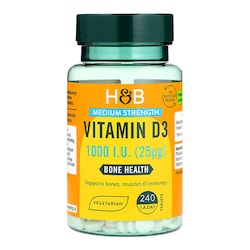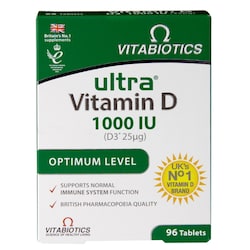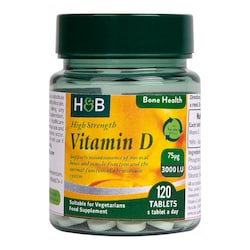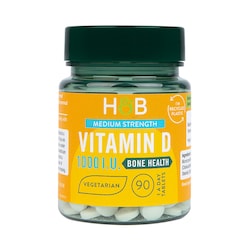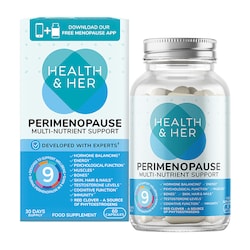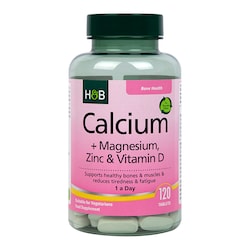20% off £30
How to test your vitamin D levels & why it is so important

If you don’t like being in the sun, are strict with your SPF routine, tend to cover up with clothes, have darker skin, or all of the above (!), you are at a higher risk of low vitamin D or vitamin D deficiency.
What’s more, the government advises everyone to take a vitamin D supplement in the autumn and winter months, as we are often exposed to less sunlight.
Although some foods are rich in vitamin D, like oily fish, our bodies only roughly absorb 10% of vitamin D from this source. The other 90% is made in our bodies, and this process requires sun exposure.1
Common symptoms of vitamin D deficiency include low mood, weak muscles and getting sick a lot. Stick with us to learn more about vitamin D and our health, how to test your vitamin D levels and why it is so important.
What happens when your vitamin D is low?
Your bones really don’t like it! You may have already heard about the link between rickets and vitamin D in children (osteomalacia in adults).
Low levels of vitamin D can be difficult to spot until it’s too late and you are dangerously lacking; yet around 1 in 5 people in the UK have low vitamin D levels according to national surveys.2
Your body needs vitamin D for the following functions:3
- Supporting the immune system
- Musclefunction
When your body is low in vitamin D, it can show in a variety of ways, including:4
- Joint and bone aches
- Growth problems
- Constipation
- Gum disease
Handpicked content: What is vitamin D and why is it so important?
Benefits of home vitamin D diagnostic kits
Benefits of home vitamin D diagnostics kits can include:
- No doctor’s appointment necessary
- Don’t need to book off work / use holiday
- Do it whenever is best for you
- Quick and easy
However, it is important to keep in mind that these sorts of tests are no substitute for seeing your doctor, especially if you are suffering symptoms, as these companies will not be able to diagnose, consult or provide any treatment.
But, if you just want to know for peace of mind or if you should be upping the vitamin D in your life, they can provide very useful.
How do home vitamin D blood tests work?
It depends on the brand, but generally a home vitamin D level test will work a little like this:
- You order a test online or pick up a test kit from a store / clinic.
- It will likely contain a finger prick and corresponding vial to collect blood from your finger so that it can be tested for vitamin D.
- You will have to send it to a return address / lab or arrange for somebody to collect it for you.
- It will get tested (hopefully by an accredited laboratory) and the service provider should contact you to tell you your results.
Do home vitamin D blood tests work?
If you go with a reputable home blood test brand that sends out good testing kit, clear instructions, and uses accredited laboratories to test your blood samples, and details/communicates your results clearly, then yes, they should work.
Obviously, you have to take ownership of following instructions correctly and completing ‘your part’ at home, as this is the most important bit to get right!
How to choose an at home vitamin D test kit:
As we touched on above, the most important things you need to consider when choosing an at-home testing kit for vitamin B12 include:
- Check if they measure vitamin D (25 OH), as testing for this majorly circulated form of vitamin D is currently considered the best indicator of vitamin D supply to the body https://www.bda.uk.com/foodfacts/VitaminD.pdf
- Do they use accredited UKAS laboratories (or equivalent) to test your samples? You don’t want just any old lab testing your results, make sure they are the real deal
- Do they have doctors on hand to help interpret your results? Some aftercare is sometimes necessary, especially if you have confusing results, so check if they have a doctor on board to help if needed.
- Do they have good reviews? Check their brand website and the reviews they have received to see what other people think of their service.
How to get the best results from a home vitamin D kit
Here are a few tips on how to get the best results from any home blood test kit:8
- To accurately determine deficiency or low levels of vitamin D you must take the test before you take any vitamin or mineral supplements. Ask your doctor about this if it is prescribed to you.
- You should also avoid taking biotin supplements for at least 2 days before you test – again, check with your doctor if it’s prescribed to you
- Follow instructions accurately for your specific blood test kit
Medichecks Vitamin D (25 OH) Blood Test
If you would like to check your vitamin D levels at home, this at home vitamin D test kit by Medichecks could be for you!
Key benefits:
- Measures the major circulating form of vitamin D (25 OH)
- An easy and affordable way to check if your vitamin D levels are normal or you are deficient
- Simple finger-prick sample method, which is sent off and checked by accredited laboratories with a doctor’s interpretation
- Results in 2 working days from sample receipt at lab
How to keep your vitamin D levels healthy
If you do discover you have a vitamin D deficiency or low amounts in your body, you should always seek the advice of your GP, who can help you get to the root of the cause and advise treatment.
Vitamin D supplements are widely available if you worry that your diet or other lifestyle factors may eventually lead to depleted vitamin D levels.
Most multivitamins contain vitamin D too, and it doesn’t hurt to pre-empt any potential vitamin D issues by supplementing, especially if you don’t eat many Vitamin D-rich foods.
The UK government recommends that breastfeeding babies (baby formula already contains vitamin D) all the way up to 5 year old children should be given a vitamin D supplement: 8.5-10mcg for under 1 year old and 10mcg for the rest.5
Children aged 5 years + and adults (including pregnant and breastfeeding people) should also consider taking a vitamin D supplement during the autumn and winter months.
You can also easily increase the vitamin D in your body by eating some or all of the following:
- Oily fish, like salmon and sardines
- Fish and algae oil
- Red meat, especially liver
- Eggs
- Milk
- Fortified plant milks
- Fortified meat substitutes
- Fortified orange juice
- Fortified breakfast cereals
- Mushrooms
Click here for more advice on vitamin D, what it does, and how to keep your levels up.
The final say
- A vitamin D deficiency can severely impact your life, so it’s important that you get tested if you start to experience symptoms or are in a high-risk group
- Vitamin D supports the immune system and helps us maintain healthy bones, teeth and muscles
- You usually find vitamin D in red meat, fish, dairy, eggs and fortified milks / breakfast cereals/mock meats
- Vegans, vegetarians and people with darker skin, who don’t go out in the sun a lot or cover a lot of skin when they do are all at a higher risk of vitamin D deficiency
- A blood test is usually used to check vitamin D levels, which you can get from your Dr or order to complete at home from private companies
- If you opt for an at-home vitamin D test, make sure they are reputable and used professionally accredited laboratories to test your sample
- Always consult your doctor if you suspect or discover you are deficient in vitamin D, as they can help find the cause and the best treatment for you
Last updated: 20 January 2022
- https://healthywa.wa.gov.au/Articles/U_Z/Vitamin-D
- https://www.nutrition.org.uk/nutritioninthenews/new-reports/983-newvitamind.html
- https://www.hsis.org/a-z-food-supplements/vitamin-d-cholecalciferol/
- https://ods.od.nih.gov/factsheets/VitaminD-HealthProfessional/
- https://www.nhs.uk/conditions/vitamins-and-minerals/vitamin-d/


